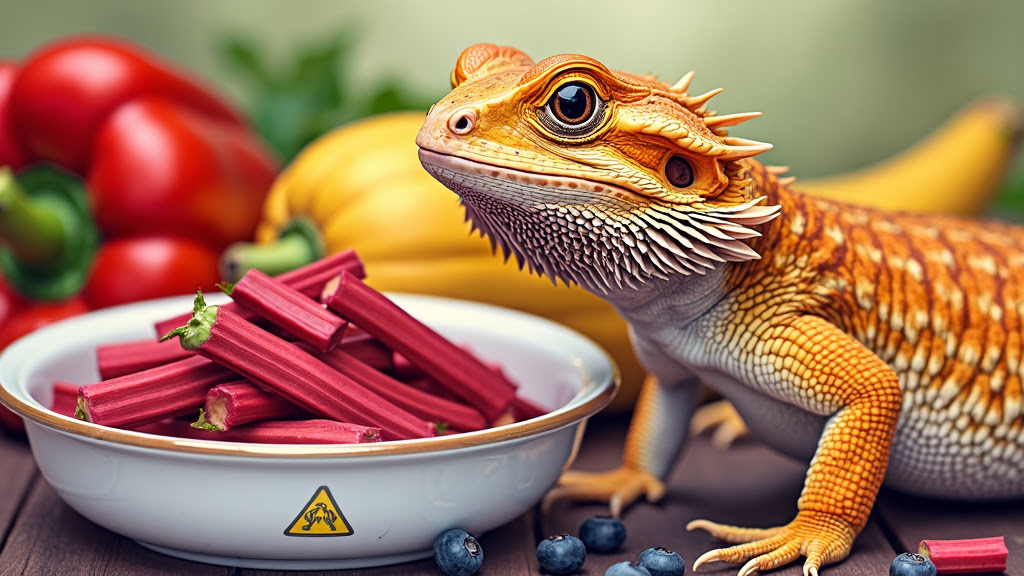Bearded dragons are one of the most popular pets, and it’s no surprise. With their funny personalities and cute faces, they quickly charm their owners. But to keep these little reptiles healthy and happy, their diet is really important.
Making sure your bearded dragon eats a balanced diet is essential for their health and long life. This blog post will explore if rhubarb is a good choice for their meals and understand the risks and dietary needs related to it.
Understanding Bearded Dragon Dietary Needs
First, let’s see what bearded dragons eat in the wild. They come from the dry regions of Australia and eat a mix of insects, vegetables, and fruits.
Even in captivity, their dietary needs are pretty similar. They need a good mix of proteins, fats, vitamins, and minerals to stay healthy. Proteins usually come from insects, and vitamins and minerals come from fruits and vegetables.
It’s important to give them a variety of foods to make sure they get all the nutrients they need and to keep their meals interesting! Think of it as giving your beardie a buffet instead of the same old salad every day.
Rhubarb: A Detailed Look
Rhubarb is known for its tart flavor and is often used in desserts like pies and crumbles. But just because we eat it doesn’t mean it’s good for your bearded dragon.
Nutritionally, rhubarb has some good stuff like vitamins C and K, fiber, and calcium. Unfortunately, it also has things that make it bad for bearded dragons.
Oxalic Acid: The Hidden Danger in Rhubarb
One big problem with feeding rhubarb to bearded dragons is its high oxalic acid content. But what is oxalic acid? It’s a natural compound found in many plants. While it’s usually safe in small amounts, it can be poisonous in larger amounts.
For bearded dragons, oxalic acid binds with calcium, making it useless. This stops their bodies from absorbing calcium, leading to a lack of it. Over time, this can cause metabolic bone disease, which is very serious and can even be deadly.
Symptoms of oxalic acid poisoning in bearded dragons include being very tired, muscle twitching, and not wanting to eat. If you think your bearded dragon has eaten something poisonous, you should see a vet right away.
Case Studies and Personal Experiences
When it comes to feeding your bearded dragon, experience is a great teacher. From my own trials and errors, I’ve learned that not all vegetables and fruits are good for your beardie.
For example, I once thought a tiny piece of avocado would be a yummy treat. But avocados are actually toxic to bearded dragons! Luckily, a quick call to the vet saved the day.
Comparing rhubarb to other foods like bell peppers and squash, it’s clear that sticking to safe, well-known veggies is a better idea. I’ve talked to other bearded dragon owners who also had food mishaps—no one has had success with rhubarb!
Safe Alternatives to Rhubarb
Just because you can’t feed rhubarb doesn’t mean your bearded dragon’s diet has to be boring. There are lots of safe and tasty alternatives. Here’s a list of beardie-approved veggies and fruits:
- Bell Peppers: Rich in vitamins A and C
- Collard Greens: Great source of calcium
- Squash: Full of fiber and vitamins
- Blueberries: Occasional treat, full of antioxidants
- Carrots: Good for vitamin A but serve in moderation
- Apples: Serve without seeds, gives dietary fiber
Always wash and cut these foods into small pieces to make it easier for your dragon to eat them.
General Feeding Tips for Bearded Dragons
When feeding your bearded dragon, variety and moderation are important. No one likes eating the same meal every day, and your beardie is no different. Introducing new foods slowly prevents any digestive problems.
Also, look out for any signs of diet-related issues like sudden weight loss, tiredness, or changes in their poop. If these symptoms show up, it’s time to see a vet.
Importance of Veterinary Guidance
Regular check-ups with a vet are crucial for your bearded dragon’s health. A professional can give you specific advice and catch any problems early. Remember, if something seems wrong, it’s always better to be safe than sorry.
Conclusion
In summary, don’t feed rhubarb to your bearded dragons because of the risks of oxalic acid. Instead, give them a balanced diet with safe, nutritious vegetables and fruits.
At Dug’s Bugs, we believe in making life fun and exciting for you and your scaly friend. So go ahead, explore different safe food options, and make mealtime an adventure!
If you have any questions or comments, feel free to leave them below. Happy feeding!
Additional Resources
Taking care of your bearded dragon’s diet is very important for their health and happiness. If you’re ever unsure, ask an exotic pet vet or nutritionist to make sure you’re giving your beardie the best care.




